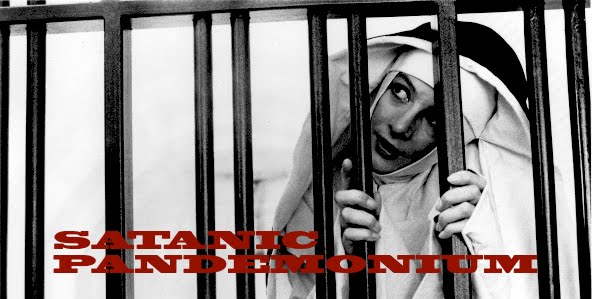Rainer
Werner Fassbinder, 1974
Starring:
Hanna Schygulla, Wolfgang Schenck, Ulli Lommel, Lilo Pempeit
The
young and beautiful Effi Briest is encouraged by her ambitious mother to marry
an up-and-coming politicians, the Baron Innstetten, though he is twice her age.
She is delighted in the match and expects that Innstetten will shower her with
gifts and attention. But they move to an isolated coastal town and he spends
most of his time working, expecting Effi to entertain herself at home. She soon
grows bored and frustrated and takes a lover – Innstetten’s acquaintance, Major
Crampas. The affair quietly dies down, but years later, a loyal maid discovers
Crampas’ hidden letters to Effi and gives them to Instetten with tragic
results.
Also
known as Fontane Effi Briest or the
improbably long Fontane Effi Briest or
Many People Who Are Aware of Their Own Capabilities and Needs Just Acquiesce to
the Prevailing System in Their Thoughts and Deeds, Thereby Confirm and
Reinforce It, this has long been considered one of Fassbinder’s greatest
films, though I have to admit that I don’t quite understand the allure. It is,
without a doubt, a beautiful film and is a rare period piece, set in Bismarck-era
Prussian society. This restrained,
carefully-paced film plots a woman’s rebellion against the claustrophobic,
demanding, and unloving society that would prefer to see her as a jeweled bird
in a gilded cage. I take this to be part of a loose, similarly-themed trilogy
of 1974, where Fassbinder made three films about the oppressive domestic lives
of women: Effi Briest, Martha, and Nora Helmer (an adaptation of Ibsen’s A Doll’s House).
Possibly
the most interesting aspect of Effi Briest
is that Fassbinder’s typical theme of emotional cruelty is so restrained. Effi
is not beaten or abused; she is merely unloved and misunderstood. Fassbinder
suggests that those who survive Effi – after her death of heartbreak -- are
directly responsible for her plight, rather than Effi herself. Those around
her, including her parents, her husband, and her daughter, essentially
interpret that she has betrayed them, or somehow bitten the hand that has fed
her. But Fassbinder shows that she is merely rebelling against a broken system,
one that promises her love and affection, but cruelly dangles them in front of
her, yet forever withholds them. She is punished for a past indiscretion, a
moment of affection that could not even be fairly described as love.
This
quiet encounter is actually how she learns about the artifice of her marital
and social cage. Early in their marriage, her husband informed her that a dead “Chinaman,”
a former servant, haunts her bedroom. She is absolutely terrified for the first
half of the film and often has horrible nightmares and anxiety attacks, and refuses
to sleep alone. She later learns, to her subdued sense of horror and betrayal,
that this is simply a mean-spirited ploy meant to keep her prisoner
psychologically. Her husband, played by physically-imposing
Fassbinder regular Wolfgang Schenk after a similar role in Bremen Freedom, clearly adores Effi, but as a status symbol rather
than a human being. He is not portrayed as a villain, rather as a rigid example
of his society. He ultimately claims that he has shunned Effi for her
indiscretion, not because he wanted to, but because that’s what society would
expect of him.
Based
on Theodor Fontane’s popular German novel of the same name, this black and
white film is essentially a sexless film about adultery, a restrained melodrama
with utterly unemotional moments of betrayed love and dishonor. The major
scenes – Effi’s marriage and its consummation, the birth and infancy of her
daughter, her affair with Crampas, the fatal duel between he and Innstetten –
are quickly passed over. What would normally unfold dramatically is either
narrated (by Fassbinder himself) or presented with a brief scene and a line of
text. Each scene feels separate, vignette-like, and there is the sense that the
characters are sleepwalking, which such a staple of Fassbinder’s first few
films and his theatrical productions.
It
is hard to find overt fault with Effi
Briest. The performances, especially from Fassbinder regular Hanna
Schygulla, are solid and the story of a woman’s resistance against a society
who refuses to love in favor of ambition, bourgeois ritual, and success should
be compelling. But the somnambulistic nature of the film dampens this,
particularly in comparison to similarly removed films like The Bitter Tears of Petra von Kant, Fear of Fear, or Whity, all of which are superior to Effi Briest. There is simply no life in
the film – as there is arguably no life in Effi’s existence – and the rare
spark provided by a brief appearance from the wonderful Karlheinz Böhm casts
this sharply into relief.
This
is a rare case where I would suggest that, if you’re a Fassbinder fan, you give
the film a chance regardless of my review. It’s available on German
DVD and is certainly a compelling experiment, despite its flaws. At the minimum, it proves yet again that
Fassbinder was moved to make films about repression in all its forms and
created particularly complex and moving films about the difficult lives of
women.


No comments:
Post a Comment